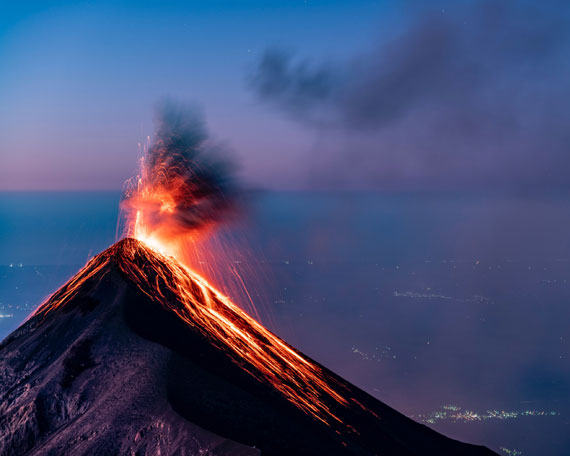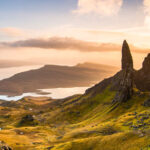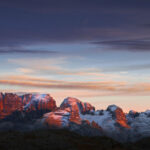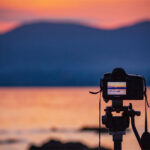Photography is all about the subject, but both it and the pursuit can be as varied and diverse as life on Earth. Extreme nature photographers like Mike Mezuel II live to capture the beauty of some of the most dangerous natural phenomena. A self-confessed adrenaline junkie, he has trekked far and wide — risking his life in the process — to get that perfect shot. In the latest YouTube video, Where the Fire Is, the crew follows Mike, trekking more than 12,000 feet above sea level to capture the active Volcán de Fuego in Guatemala. Let’s explore his artistic process and the inspiration behind why he does what he does.
Lesson 1: Be Curious and Explore
Day 1 takes Mike and the expedition crew up to basecamp, where a stunning view of Volcán de Fuego (the Volcano of Fire) awaits. After trekking all day at high elevation, everyone is exhausted — and the weather isn’t cooperating either. The crew settles down to get some much-needed sleep after pitching their tents and taking in the scenery. Mike is all about taking the path less traveled and encourages all photographers to be curious and explore.
I fell in love with the sky at an early age, and that only developed into, you know, falling in love with storms… I became more and more passionate about, okay, what other powerful events does this world have?
Day 2 starts bright and early on a cold, windy day at 4:30 am. Excited and hungry, the crew begins their hike closer to Volcán de Fuego. After arriving in the valley, Mike sets up his cameras to take some shots. The weather is perfect, allowing him to enjoy the view with his long-time friend, Diego. Specializing in tours of the volcano and being a local, he has assisted Mike’s visits to it and the country many times. Known as Chi’gag, or “where the fire is,” in Guatemalan, it has a special place in local photographers’ hearts. Mike believes that wherever your fire and passion lies is the exact place to start your photography journey.
Lesson 2: Get Inspired by Detours
After waking up on Day 3, the crew is met with the kind of bad weather Mike doesn’t want to capture. A fog has completely obscured the volcano — and, dangerously, the trek to it. They decide to sit tight and head to the nearby town of Antigua instead, where they can freshen up. Then, head back to camp safely in the valley between Acatenango and Fuego, where they will launch a second attempt to summit the volcano. While they wait, the crew takes time out with the family of their porters, who invite them in for a traditional meal.
It would really, really be nice to kind of bring in another angle to the life of Fuego, essentially, and that’s the people that work on it…
Inspired by the tenacity of the porters, Mike takes the unexpected opportunity to photograph their lives. After all, his trek to Fuego would not be possible without their help. Porter’s don’t just carry unfathomably heavy amounts of luggage, including bulky essentials like food, water, firewood, and photography gear. Being locals, they also know the area, safely guiding travelers along trails and proving indispensable in an emergency. Throughout the trip, Mike trains his camera equally on their efforts, telling the story from their angle.
Lesson 3: Know Your Limits
After the weather clears, their batteries are recharged, and it’s safe to do so, the crew heads back to the mountain. Diego’s friend, Lucia, joins them, hopefully, so that she can pose in traditional Guatemalan attire with the volcano behind her. As you can see, Mike knows how to elevate a shot by celebrating the culture and real stories behind the natural phenomena he chases. He also prioritizes safety (both his and his crews).
Day 4 sees the crew finally arrive at Camellón del Volcán de Fuego — otherwise known as the “ridge” or “shoulder” of Volcán de Fuego. It is the ultimate vantage point to view The Volcano of Fire in all of its glory — and take some equally stunning shots, of course! With 50 mph winds nudging them and their gear and an awareness of the imminent danger of a hot lava overspill, they get to work shooting. Coming as close as 500 meters to the erupting crater, Mike needs to be careful.
You know, when you go out, it’s easy to get so focused on creating an image or telling a story, but I think the most important part of all this is keeping a healthy respect for what it is that you’re looking at…
Lesson 4: Failure Is a Gift
Aside from the convenient Camellón del Volcán de Fuego vantage point, the volcano has good photography potential. Usually erupting every 20 to 40 minutes, Volcán de Fuego is the most active volcano world. Unlike some other volatile subjects — where a shot is not always guaranteed — Fuego rarely misses a beat. That’s one of the things Mike loves so much about shooting at this site, despite the apparent risks.

Volcán de Fuego captured by Alain Bonnardeaux
With numbing cold, fierce wind, and failing light to contend with, hot lava is just one of his concerns today. That said, the lighting couldn’t be better, with clear conditions and the ultimate complimentary lava-inspired reddish-pink tint staining the sky. Unfortunately, and entirely out of character, Fuego is having none of it. Despite the perfect setting, the volcano doesn’t erupt, sending Mike despondently back to camp to regroup.
You know, when you go out and photograph these events, you have to accept that you’re going to fail, over and over and over again… (but) if you don’t fail, you don’t appreciate that moment when it actually happens in front of you.
Trekking back the following day to give capturing the Volcán de Fuego one more shot, he’s greeted with precisely what he wanted. The mountain erupts, billowing black ash and soot high into the sky. Lucia also gets her moment, posing artfully — yet tentatively — in front of the volcano, wearing a matching traditional pink print garb as Fuego erupts for a second time.
To Conclude:
Though Mike didn’t get the exact shot he visualized, he knows that persistence and failure are all part of the journey. He hopes this Where the Fire Is vlog will encourage everyone, not just photographers, to get out there to explore. The world is full of wonders. Chasing thrilling sights such as the Volcán de Fuego is just the tip of the iceberg!
Like This Article?
Don't Miss The Next One!
Join over 100,000 photographers of all experience levels who receive our free photography tips and articles to stay current:





